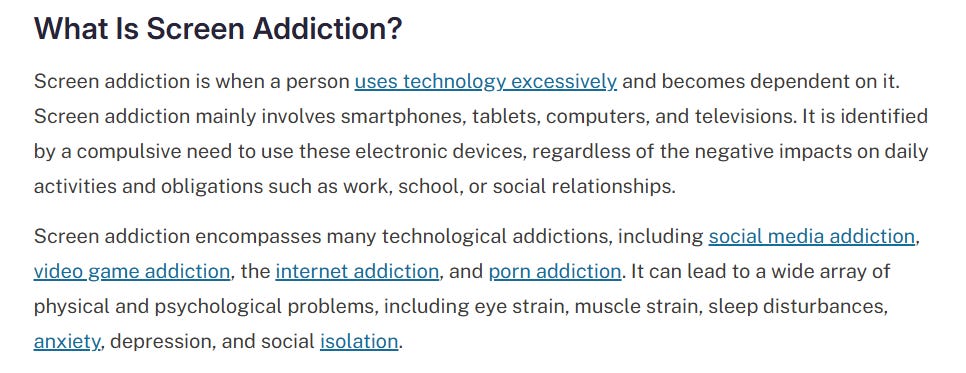Hello!
I’d like to start off by saying this post is not a prescription. It is not advice. I am simply sharing my journey, and my thoughts on this topic. I don’t think badly of you if you have arrived at a different conclusion than I.
I don’t like the phrase “screen time.” To me, it sounds like we are trying to propose that having times of checking out on technology is as necessary as having “supper time” or “bath time.” However, those activities are inherently essential to our well-being, while scrolling on social media, playing an iPad game or watching Netflix are not.
There’s a lot of “buzz” around our relationships with technology and more specifically, handheld screens. It’s not disputed in the wellness or the scientific community that prolonged screen use leads to cognitive setbacks, including loss of memory, attention span and decision-making capabilities.1 That’s not to mention what it does to our eye-sight, sleep, and stress management. Oh, and it also affects mental health and relationships—negatively. The study that I’m referring to cites excessive screen use as “more than two hours”, albeit they exclude work time from this definition.
Ugh, and my phone tells me that my daily average is ____.
Screens also make real life seem boring.
I 100% attest to this happening in my life: on days where I use my phone more, I feel less motivated, less excited and bored by my regular life.
This video basically explains how screen usage reduces our ability to experience pleasure and excitement by dulling our dopamine receptors. Over time, we need more and more stimulation to experience these sensations.
This is so sad. Sad for me, sad for my kids, sad for everyone.
Real life is beautiful. It is exciting. If you doubt that, starting reading literature like Narnia or Little Women. Watch your kids walk in the forest. The characters in our favourite stories and the little ones among us, know the wonder, joy and excitement of normal life.
The research is compelling. But, on its own, it is not enough to make me change my ways. If I’ve learned anything from studying psychology and working in the field of addictions, it is this: no matter what you know in your head, change requires heart knowledge. It requires an intrinsic desire to change, not simply an extrinsic motivator. Many people with drug or alcohol addictions whom I have worked with didn’t argue that their addiction was good for them. They knew it in their heads that drugs and alcohol were harmful. But they didn’t have the internal conviction to do anything about it, until they did.
Maybe you feel like comparing smartphone usage to drugs or alcohol is a little… extreme. There are stark differences. But there are similarities as well.
Full disclosure— I fit into that definition. No, I don’t spend eight hours a day on my phone or laptop. I have hobbies that do not include screens. But I am dependent on them. I do not feel able to put my phone down for an afternoon, without thinking about checking it somewhat obsessively. I usually end up giving up.
Why am I approaching this topic now? I’ve had a phone for almost ten years now. Honestly, my phone use didn’t really bother me until about two and a half years ago, when I had my first child.
Being a mother has made me hyperaware of how my device pulls me out of the present moment. It has helped me realize how I use my phone to check out or self-soothe on hard days. Most of all, it has prompted me to think about what behaviours I want to model to my children, because those little eyes are always watching.
I recently listened to a podcast where Melanie Hemp, the founder of
was interviewed. Not only is her review of the research on screens compelling, but her own personal story of witnessing her son’s addiction was eye-opening.As a mother who dealt with the pain of having a child with an all-consuming screen addiction, Melanie has now started an organization to promote being countercultural, to “move your child from the online world back to the real in-person world.”
We can talk about giving kids screen boundaries all day but if we aren’t first looking at our own hearts and habits, we are not going to be able to help our children have a good relationship with technology.2
My husband is a high school teacher, and he has witnessed the lack of interest, attention span difficulties and mental health issues that plague most teenagers, all of which go hand in hand with the fact that they spend 5-12 hours a day on their phones and other devices.3 It saddens me greatly to think of all we are missing out on because of screens.
If I don’t want my children to be addicted to devices, then I cannot dabble in screen addiction. I need to live in the real world, not just expect them to.
I’ve tried a lot of things to put a boundary on how I use my phone. Blocking apps, turning off my phone for certain blocks of time or even days, but I in days and moments of weakness and exhaustion, I drift back into the listless and distracted phone usage that has become my norm and the norm of many people I know. My sister and I were talking about these kinds of efforts. Both of us will obsessively look at our photos app or check our email even when all the scrolling-type apps are blocked. We agree that the dopamine hit we crave comes just from opening our phones.
Now I will say that I think it is possible to have a healthy relationship with a smartphone. I’ve seen it done, and I am glad for the people that are able to have the discipline to create and keep strict boundaries on their own. I can’t seem to at this point in my life.
Part of this is because of a lack of virtue and discipline on my part (help me, Lord!), but also, these damn devices are made to be addictive! They are made to change your brain chemistry! They are made to steal your time!
I’m saddened that part of me is okay with being an addict. As someone who has recovered from an eating disorder, I know the harms of compulsive, unhealthy behavior and the struggle of getting over an addiction.
But I also know what freedom feels like after getting over the addiction.
“It is for freedom that Christ has set us free. Stand firm, then, and do not let yourselves be burdened again by a yoke of slavery.” (Galatians 5:1)
I desire freedom. I desire to live a peaceful life.
I see that it is not realistic for me to have a life of peace, and fully live in the present moment while also being overly dependent on my device.
In one of his first homilies, Pope Leo spoke of how every generation faces a unique set of challenges and temptations. Yet, the Holy Spirit always equips the faithful to overcome through the grace of God.
Fighting against the normalcy of technology addiction may just be one of the unique challenges facing our generation.
All of this has made me come to the conclusion that, for me, in this season of being a young mother, I need to drastically change how I use my phone. It is going to be hard. Heck, it is going to be very inconvenient. I will likely go through some kind of withdrawal. And man, the practicalities of it are daunting. It may take me some time to figure out how, but I believe peace and freedom are worth more than a little inconvenience.
It won’t be forever. Many of us need start from ground zero and rebuild a healthy relationship with technology. Maybe you feel the same?
Finally, I’m looking at this mostly as a smartphone issue. I enjoy watching shows with my husband (ANDOR!) or a few homesteader YouTube videos now and again. My toddler greatly appreciates his quiet moments of Franklin en francais and the classic Milo and Otis (seriously the best kids movie ever made). I’m not against all screens at all times for all people. I think each of us has to look at our behaviour and identify where we are experiencing a lack of freedom/ an inability to find moderation.
Maybe you’ve realized that I am writing this article mostly to convince myself. So if you are someone who has managed to effectively put boundaries on your smartphone use, tell me your story. If you’ve started a digital detox group, please invite me. And if you’ve already given up your smart phone, please enlighten me on the practical side of things (maps, podcasts, etc?)
Or if you too are struggling with healthy boundaries… maybe we can do this together? I would love to do a book club with Catherine Price’s How to Break Up with Your Phone this summer, starting in the next few weeks. If you’re interested, please reply to this email, or leave a comment, and I’ll get in contact with you with some details.
What would life look like without the constant niggling feeling that we should check our phones?
Can we learn to enjoy the simplicity of a disconnected life?
“Enlighten us, O my Saviour, that we may see what we are attached to and please set us in the freedom of the children of God.” – St Vincent de Paul
*As an Amazon Associate, I earn from qualifying purchases.
https://longevity.stanford.edu/lifestyle/2024/05/30/what-excessive-screen-time-does-to-the-adult-brain/
https://mentalhealth.bmj.com/content/27/1/e301115






I am definitely interested in reading the book how to break up with your phone!!
Thank you for admitting your struggles! I am also struggling with phone addiction. I deleted all my social media except substack and that has helped my anxiety a lot! I'd love to join in a book club about how to continue towards real life and health!